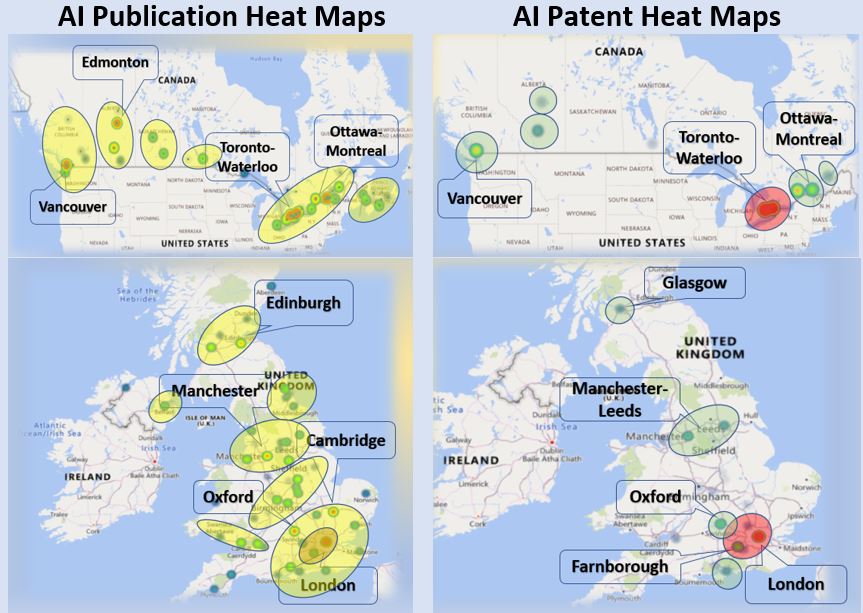A comparison between Canada and UK
By Xiaoxu Yue, Philip Shapira, Na Liu and Xiao Zhao
Innovation ecosystems is a broad conceptualization that encompasses the networks and relationships of businesses, research organizations, and other actors that support new or improved products, production processes, and business models in a particular industry or sector. In recent work, we explore a further elaboration of this concept – that of knowledge innovation ecosystems – to probe the knowledge and innovation clusters and relationships associated with the emergence of artificial intelligence (AI).
We presented a preliminary version of this work at the 10th Global TechMining Conference on 13 November 2020. Our virtual presentation – “Mapping AI knowledge innovation ecosystems: A comparison between Canada and UK” – described a new bibliometric and patent search for artificial intelligence (AI) and applied the search approach to mapping AI regional clusters in Canada and the UK and probing the evolution of internal and external knowledge linkages and networks.
To track the emergence of knowledge intensive AI innovation ecosystems in Canada and the UK, we use the signals from publications and patents in the AI domain. Canada and the UK are among the top 8 countries in global AI publication and patent activities (with China and the US the two leading performers).
We observe that Canada and UK have comparable overall growth trends, with sustained growth in AI research and innovation over last 3 decades, and accelerated growth in last 5 years. US companies are strongly present in AI research and innovation activities in Canada and the UK. And in both countries, there are growing links with Chinese research institutions and companies in the AI sector. Prominent in the next tier of linkages are the UK and Canada with each other, with selected Europe countries, and with India and other Asian econlomies.
Our analysis shows that AI innovation in the UK and Canada is regionally clustered. In the UK, the dominant location is London, followed by Cambridge, Oxford and Manchester. In Canada, AI innovation leading locations include Toronto, Montreal, Waterloo and Vancouver. But there are regional distributional differences. Although there are other hubs in the UK, its AI innovation networks are highly concentrated in London. Canada has several AI hubs across its provinces. This contrast likely reflects differences not only in geographic scale but also urban hierarchy, industrial distribution, and policy.
Notwithstanding these differences, we do see that since the 2000s, the number of cities in both Canada and the UK engaged in AI research and innovation has grown noticeably. This is an indication of the emergence of AI as a platform technology that is being developed and applied across a wide range of industrial and service sectors. AI research networks include hospitals and other research organizations as well as universities.
AI city-region innovation hubs in Canada and the UK exhibit both within-region and supra-regional knowledge linkages. AI international collaboration is mostly driven by research organizations (publications) and larger international companies (patents). The large AI knowledge innovation ecosystems of London and Toronto have the greatest international collaborations
A video [08:27] of our presentation is available here.
Xiaoxu Yue (Tsinghua University) is a visiting doctoral researcher (2019-2020) at the Manchester Institute of Innovation Research (MIOIR). Philip Shapira is Professor of Innovation Management and Policy at MIOIR in the Alliance Manchester Business School, The University of Manchester. Na Lui is a Professor in the School of Management at Shandong Technology and Business University and a Visiting Researcher (2019-2020) at MIOIR. Xiao (Mimosa) Zhao is in the MBA program at the Rotman School of Management at the University of Toronto and is a member of the Canadian team working on the joint MIOIR-University of Waterloo 4POINT0 project on “Anticipating transformative innovations and their implications: AI innovation strategies in Canada and the UK.”
The research was undertaken as part of the project on “Anticipating Transformative Innovations and their Implications: AI innovation strategies in Canada and the UK,” with support to the University of Manchester and the University of Waterloo from the Partnership for the Organization of Innovation and New Technologies (4POINT0) at the Polytechnique Montréal, Canada (Social Sciences and Humanities Research Council of Canada, grant number 895-2018-1006).

